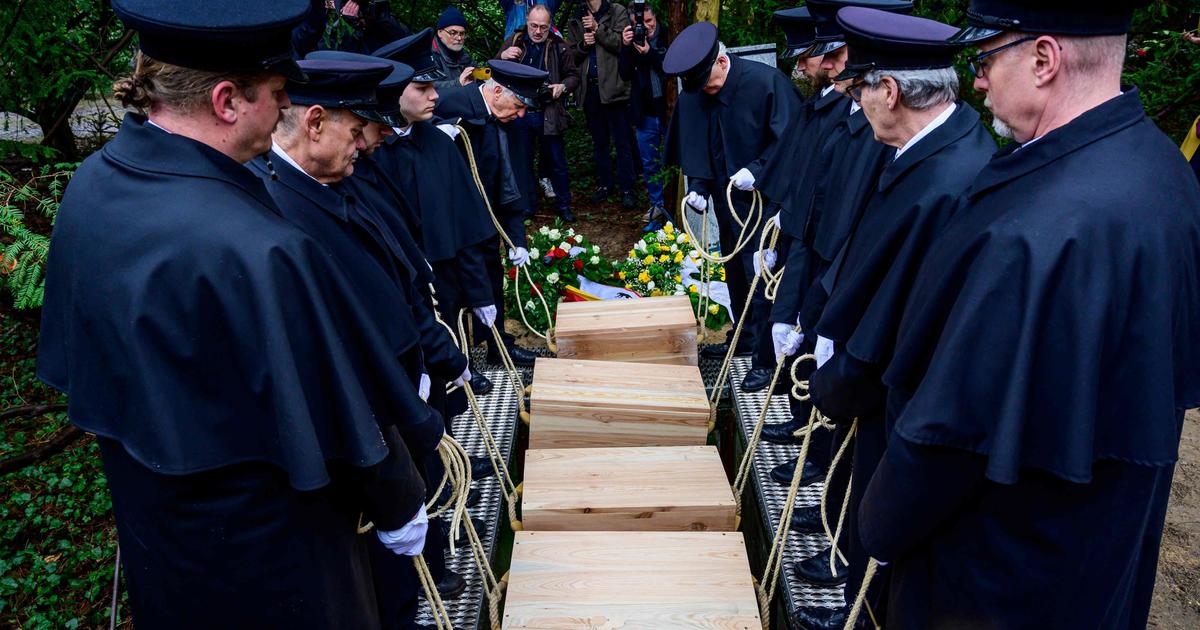A bodyless funeral for victims without an identity: A Berlin university on Thursday buried thousands of bone fragments discovered on campus, stigmata of "crimes" committed in the name of Nazi-era science and practices.
In 2014, construction workers made a gruesome discovery while working on the site of the Free University of Berlin (Freie Universität, FU): human bones.
Some 16,000 bone fragments have been unearthed up to 2016.
Cautious conclusion of the experts after several years of research: the bones come from “
criminal contexts
”, going back in particular to the colonial period, and “
part of the bones can also come from victims of Nazi crimes
”.
"We need to remember"
These discoveries shed light on the practices and ideology of the sulphurous Kaiser Wilhelm Institute for Anthropology, Human Genetics and Eugenics (KWIA), a haunt of Nazi scientists during the Second World War, on the site of which was the pit containing Leftovers.
“
There are crimes on which no grass grows or should grow.
We need to remember
,” said FU President Günter Ziegler at the burial ceremony held in a cemetery in the west of the capital, not far from campus.
The bones, placed in five wooden boxes, were carried to a stele covered with wreaths of flowers.
According to the expertise of archaeologists, the bones belong to at least 54 adults and children, men and women, the majority of this macabre collection dating from at least two centuries ago.
There are also skeletal fragments of rats, rabbits, pigs and sheep.
"Ethnological" collections
After lengthy consultations, the university decided not to pursue further investigations into the identity of the deceased.
The risk would have been, explained Mr. Ziegler to AFP, to end up with categories "
according to the different crimes and the different parts of the world
", recalling the racist classifications of the past.
"
We would then have reproduced exactly what we wanted to avoid
," said the manager.
“
Of course I would like to know who these people were, but that would not have been appropriate
”, agrees Susan Pollock, who led the research.
No bone was found intact, describes this professor of archeology: “
some are the size of a fingernail, others are about ten centimeters
”.
Experts speculate that many could come from the so-called ethnological collections of the Kaiser Wilhelm Institute, including bones from colonial crimes.
The first director of the KWIA, Eugen Fischer, "
carried out research in the German colonies of southern Africa at the beginning of the 20th century
", recalls Susan Pollock.
The institute also housed the extensive collection of anthropologist Felix von Luschan, "
involved in collecting human remains around the world
".
“Manipulated human lives as things”
“
This institute has manipulated human lives like things
,” observes Susan Pollock.
On a building on the FU campus, a discreet rusty plaque recalls the abuses committed by KWIA researchers during the Nazi era.
Josef Mengele, sadly known for his experiments carried out on deportees from the Auschwitz camp, was a member of this institute, created in 1927. From Auschwitz, Mengele sent "corpse eyes to those in
charge of the institute
", but also other organs," Pollock said.
Limited identification attempts
Germany has already carried out numerous, albeit belated, studies on the identification of thousands of people exterminated under the Third Reich, within the framework of the “
euthanasia programs
” of the Nazi regime, in which doctors and scientists collaborated.
In the case of the remains discovered at the FU, the decision not to pursue further identification attempts was made in consultation with the groups representing the alleged victims - including the Central Council of Jews in Germany, the Sinti and Roma from Germany and that of the African community.
“
Victims are victims.
We do not want to distinguish them or determine their origin.
We simply yearn for solidarity from our society when minorities are attacked
“, underlined during the ceremony on Thursday Daniel Botmann, director of the Central Council of Jews in Germany.
The stele under which they rest pays homage “
to the victims of crimes committed in the name of science
”.

